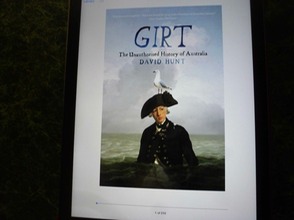Thursday, 20 March 2014
 Spend any time at all contemplating the notion that there’s a “Real Australia” lurking out there somewhere or pondering the possibility of an Australian identity, and you’ll more than likely come to recognise that we’re rather good at denialism.,
Spend any time at all contemplating the notion that there’s a “Real Australia” lurking out there somewhere or pondering the possibility of an Australian identity, and you’ll more than likely come to recognise that we’re rather good at denialism.,
Now, The Argumentative Reader might contend denialism is a little bit strong, and in the face of that sort of criticism you might be tempted to water things down a little. Substitute a firm but polite we’d rather not talk about that, thank you very much, perhaps.
That’s one of the things I tend to find interesting when the subject of the History curriculum rears its head from time to time. There seems to be an unwillingness to consider certain topics, and if anyone’s scratching their heads and wondering why students find Australian history boring, you might start by considering the possibility that we’ve chopped out most of the interesting bits because there’s stuff in there that we’d rather not talk about.
My primary school exposure to Australian history came, of course, in an entirely different era, and one in which the possibility of someone producing something like the title under discussion here wasn’t totally non-existent. Just mostly, like about 99.999999%
Author David Hunt is, among other things a comedy writer, and takes great delight in lampooning Australia’s earliest years, taking the narrative as far as the end of the Macquarie era. That leaves a fair bit of territory to explore, and hopes he has the inclination to continue.
He covers all of what one might term the usual suspects, from the Indigenous destruction of the continent’s ancient megafauna by fire, through Makassan fisherman trading in Arnhem Land to seventeenth-century Dutch explorers sailing along the Western Australian coastline busily nailing plates to trees. In 1606, Willem Janszoon landed near present-day Weipa and named the land he’d discovered Nova Guinea, as distinct from New Guinea, which he labelled Os Papua, part of which he called Nieu Zelandt. Hunt is rather good at coming up with that sort of detail and displays a remarkable ability to dig around and come up with something that’s strange enough to be true, and cites Mark Twain’s take on Australian history: It does not read like history, but like the most beautiful lies … but they are all true, they all happened.
And, of course, when he gets to the English contribution to our nation’s history and national identity things get really interesting. We get the connections between Captain Cook of the Endeavour, and Star Trek ‘s Captain Kirk of the starship Enterprise and learn that the first and last space shuttles, took their names from the two vessels.